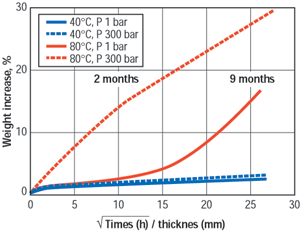 Technology from Europe: Technology from Europe:
France
Thermal insulation of deep-sea flowlines
The thermal behavior of fluid transport pipelines must be increasingly taken into account in new field developments, to prevent production of waxes or hydrates. The deepest developments (water depth >1,500 m) are particularly sensitive to these problems, and solutions are needed for such depths. The current solutions – coated pipe, pipe-in-pipe, syntactic foam – have to be adapted to ultra-deep water, as there are limitations in terms of thermal conductivity, hydrostatic pressure and installation possibilities. Thus, more-satisfactory solutions have to be found for the different installation procedures currently in use.
In the framework of the CLAROM (club for research on offshore structures), IFREMER, on behalf of a group of companies including Stolt Offshore, Bouyges Offshore, TotalFinaElf, IFP and BV, managed a research project on the evaluation of insulation materials usable for ultra-deep pipelines (1999 – 2002). 1-3 It addressed evaluation of the behavior of materials used for passive insulation (syntactic foams, elastomers) in terms of the evolution of thermal and mechanical properties with time (see figure). The objectives of this project were to: 1) propose test methodologies to evaluate properties of candidate materials for insulation of pipelines in ultra-deep sea (up to 3,000 m, and up to 150°C); and 2) collect a database on 10 different materials currently available. This project has brought together actors from all areas of the offshore industry (operators, contractors, certifying authority, manufacturers and research centers).
According to the fact that new materials are available and that other site conditions (temperature, pressure) have to be considered, IFREMER, IFP and BV are now pleased to present a Joint Industry Project on “Thermal insulation of deep sea flowlines” (TIDEEP). The JIP will be based on the knowledge gained during the previous CLAROM project.
 |
Some results on syntactic foam aging in seawater under combined temperature/pressure effects.
|
|
The overall objective of the TIDEEP JIP is to offer a common, industry-wide understanding of the characteristics of available thermal insulation materials which can be used in insulation systems for deepwater applications. TIDEEP aims to address specific characteristics of integral external coating materials which can be used for dynamic applications, even though they will only be tested in static conditions. Such characterization will represent a budget which is several times less than what would be involved for a complete qualification of materials according to recommendations to be issued by API from the InSpec JIP conclusions.
The tests will be performed in renewed seawater conditions at two service pressures (200 and 300 bar) and a maximum temperature of 130°C, and with measurements of the oxygen content. Thus, the temperature range will be from 4°C to 130°C. TIDEEP is divided into three phases and will focus on the following: 1) Screening of products – a preliminary screening test of 10 selected materials according to their expected performance, to choose five candidate materials for long-term tests; 2) On five retained products – a complete qualification of their behavior to determine thermo-mechanical properties, and a determination of the aging effect due to a combination of effects of temperature, seawater (plasticization, hydrolysis) and hydrostatic pressure; and 3) Analysis – a proposition of models to extrapolate test results and derive long-term properties (up to 20 years) which will be based on accurate analysis of degradation mechanisms and possible use of approved models.
Operators, installation/construction contractors and engineering contractors are invited to participate in this JIP. Thermal insulation material suppliers are invited to provide their materials. For every participant and material supplier advantages of participating include: 1) benefits of the CLAROM project experience of the TIDEEP contracting companies to conduct such a project based on dedicated facilities (tests in seawater with high temperature and high pressure; 2) information and knowledge gained on thermal insulation materials, with a clear understanding of the material behavior and possible degradation mechanisms, to provide specific data essential for design and confident use of thermal insulation systems; and 3) an international focus for knowledge sharing between operators, installation/ construction contractors, engineering contractors, and material suppliers. 
LITERATURE CITED
1 Choqueuse, D. et al., “Thermal insulation for ultra-deep pipelines: A research and evaluation program,” DOT 2000.
2 Choqueuse, D., et al., “Insulation materials for ultra-deep sea flow assurance: How to predict a 20-year lifetime,” DOT 2001.
3 Choqueuse, D., et al., “Insulation materials for ultra-deep sea flow assurance: Evaluation of the material properties,” OTC 2002.
|

 Technology from Europe:
Technology from Europe:

